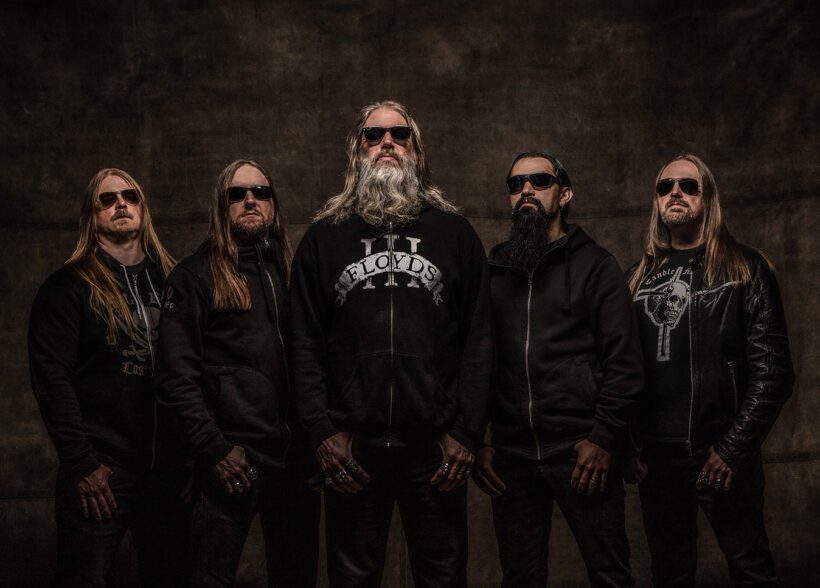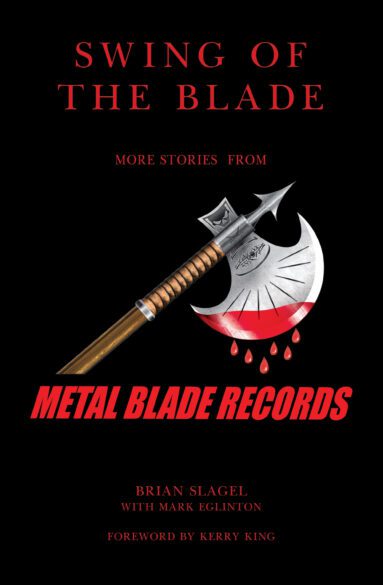
Photo by Tomas Gidén
We’re counting down to the publication date of Metal Blade Records founder Brian Slagel’s upcoming book, Swing of the Blade: More Stories from Metal Blade Records with a new exclusive excerpt from the tome. This week, we present a portion of the chapter “In Search Of,” which features Scandinavian death metal warlords Amon Amarth. If you want to read more, Swing of the Blade is set for a May 9 release and can be preordered here).

In Search Of
I saw Amon Amarth at the Prudential Centre in New Jersey and they came out with a big production, looking and sounding like they absolutely belonged there. Seeing them do that really made me believe that—in alliance with the great team we have in place with them in terms of management from 5B and lawyers etc.— maybe, just maybe, they could be the kind of band who can carry the metal flag after the big bands like Iron Maiden, Metallica, etc. have gone—which one day they inevitably will have.
My connection with them started like so many others. Someone in our German office said, “Hey, there’s this band from Sweden called Amon Amarth. I think we should sign them.”
I listened to the EP they had out at that time, Sorrow Throughout The Nine Worlds, which had been released on Pulverised Records in 1996 and said, “OK!”
Back at the beginning, Amon Amarth were just a good melodic Death metal band and one that had certainly enough melody in their music to potentially appeal to fans who may not be totally sold on their style of vocals. So we decided to work with them, and over the next few years we put out Once Sent From The Golden Hall in 1998 and The Avenger the following year. They were doing just fine, and having seen them at a couple of festivals I could see that they were both a good live band and a really good bunch of guys who also really did like to drink a lot—as is sometimes the case with Scandinavians! Yes, they were young kids out there having a good time, but they were always very professional.
Our office manager in Europe, the late Michael Trengert, took the band under his wing in the absence of any other real management at that time. Michael got involved in every aspect of the band: merchandising, advice, development—he pretty much became their fifth member.
They continued putting out records over the next couple of years but it was their fifth record, Fate Of Norms, where everything changed for them. The way it works for pretty much every band on Metal Blade is that whenever a record is done that I haven’t been involved with day to day, they’ll send me music to have a listen to—just so I’m on the radar with what’s going on. They finished mixing the record, and at that point I don’t think I’d even heard demos. So when I heard it my first thought was: “Wow, this band has taken a really significant turn for the good here.”
It was a really solid metal record from a songwriting standpoint. But it sounded really awful. They hadn’t had a very big budget, nor a lot of time. But I could see what was there behind the terrible mix.
“Guys, this record is really good,” I told them, “But we’ve got to remix it.”
I’m not sure what happened. Maybe because they were writing more complex stuff they’d overrun the clock. Either way, they were ready to put the record out as it was. I told them that they just couldn’t—that the songwriting was way too good to not sound great from a production standpoint.
Let me say at this point that that was one of the few times I’ve intervened with the actual art of one of our bands. I’m not a musician, I don’t know how to compose a song, but I do know what sounds good on a simplistic fan level. And as someone who has been in a studio a few times. I recognize what will work and what won’t.
While I did produce and design album covers back in the day, I only did so because there was nobody else. Nowadays, my role is more of a distant one, where I’m available to offer input and to make suggestions on a more general, directional level. Thankfully, rarely do I get demos or a record nowadays where I flat out say, “What the hell is this?”
Mostly, everyone we work with is roughly on the same page. And when it comes to me giving advice, it’s usually just little adjustments in terms of ideas on album art, improvements here and there, or, especially, tips on sequencing and mastering. Sequencing is one of the areas that tends to cause the most arguments, because everyone has their own ideas about which tracks should go where.
But this Amon Amarth record was one occasion where I had to make an intervention, and I did so because I wanted the band to benefit fully from the huge effort they’d made to elevate their songwriting. I’d never have forgiven myself if I’d simply let Fate Of Norms go out in the form it was originally in, and I doubt the band would have either.
We gave them extra money and told them to go away and do what they needed to do to fix the mix. And the result was a really great record that took off, and consequently, the touring picked up significantly.
In every sense, Fate Of Norms was a huge turning point for the band, even though there was inevitably a small minority of fans who felt that the album was too removed from the sound of their early music. These differences of opinion are impossible to avoid if you’re going to succeed. Metallica faced it when they made more commercial songs; Iron Maiden experienced it when Bruce Dickinson joined. A band can’t please everyone, but in these situations the gains usually outweigh the losses.
Simultaneously, the Amon Amarth guys were faced with the kind of pivotal decision moment that ultimately almost any band encounters. Until that point they’d been a band, yes, but they’d also been doing other jobs at home, simply because (a) they couldn’t afford not to and (b) they hadn’t made the decision to invest everything into being a full-time band. I totally understand why musicians are hesitant in that situation; we all have to pay the bills and everyone has family members who might be nervous, saying: “Are you sure you should be doing this band thing?”
Unfortunately this is the make or break point for a lot of bands and it usually happens when opportunities arise like an appealing tour where they have to decide whether they can do it, or if they can’t because someone has to work or be at home. In that crossroads situation, some go for it, some don’t and I understand both sides of the debate.
If I’m ever asked for advice in this situation, I’m always of the view that you’ve got to try and see if you can make the dream happen. If it works, it works. If it doesn’t, at least you tried. I never like to see bands look back years later and say: “Damn, I wish we’d given it a try.”
I can think of many bands that really could have done something if they’d gone all in and tried to get to that next level. Also, it’s personal. I think I feel this way because I made a similar decision myself with Metal Blade back in the day. There were many occasions where it came down to: maybe I should get a real job? But I didn’t because I never wanted to look back and think: damn, maybe the label thing could have gone somewhere.
Because I consider myself something of an eternal optimist, I have always felt that if you’re passionate about something and commit 100%, it can happen. But sometimes you need to endure tough times.
Amon Amarth committed. They quit their jobs and focused everything they had into making the band work. I’m sure they were concerned at the outset whether they’d be able to sustain themselves. We talked about it a lot with them, and I believe that Michael played a big part in encouraging them to take that next big step. Eventually they went all in and said: “OK, let’s do it. We’re going to tour the world and somehow we’ll make this work.”
From there their trajectory has been steadily upward. Part of the appeal with the band is obviously their Viking imagery and mythology. On one hand, that’s very important in that it’s the core of their identity. On the other, it’s something that has to be managed and balanced because we don’t want them simply to be labeled simply as ‘that Viking band’—which would obviously pigeonhole them unnecessarily and perhaps exclude fans who maybe don’t gravitate to the whole Viking vibe. What often happens is that a band will just naturally outgrow the genre that they’re initially part of. Take Metallica and Slayer for example. They were both called speed metal at the beginning. How many people still call them that nowadays?
To read the rest of the “In Search Of” chapter, order Swing of the Blade here.

